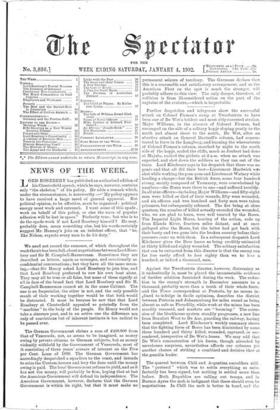Further despatches and telegrams show the successful attack on Colonel
Firman's camp at Tweefontein to have been one of De Wet's boldest and most ably executed strokes. Major Williams, in the absence of Colonel Firman, had encamped on the side of a solitary kopje sloping gently to the north and almost sheer to the south., De Wet, after an abortive attack on General Dartnell's column, had concen- trated in force in the Langberg, and learning the whereabouts of Colonel Firman's column, marched by night to the south side of the kopje, scaled the cliffs, much as Joubert had done at Majuba, rushed the pickets at 2 a.m. when no attack was expected, and shot down the soldiers as they ran out of the tents. Lord Kitchener says in his despatch that there was no panic and that all did their best—Lieutenant Hardwick wts shot while working the porn-porn and Lieutenant Watney while heading a charge—but the British force, some four hundred strong, mainly composed of Yeomanry, were overwhelmed by numbers—the Boers were three to one—and suffered terribly. In all nine officers—including Major Williams—and fifty-eight men were killed or died of their wounds, fifty were wounded, and six officers and two hundred and forty men were taken prisoners, but subsequently released. The fire being at close quarters, the number of killed actually exceeded the wounded, who, we are glad to learn, were well treated by the Boers. The Imperial Light Horse, hearing of the action, rode up from Elands River, fourteen miles distant, and at once galloped after the Boers, but the latter had got back with their booty and two guns into the broken country before their pursuers came up with them. In a subsequent despatch Lord Kitchener gives the Boer losses as being credibly estimated at thirty killed and eighty wounded. The solitary satisfaction that can be extracted from this disaster is that the enemy can far less easily afford to lose eighty than we to lose a hundred, or indeed a thousand, men.






































